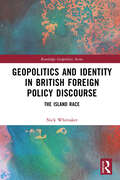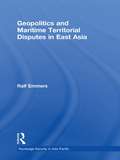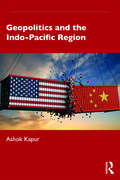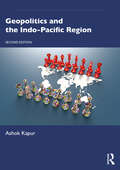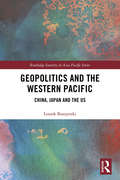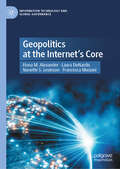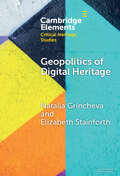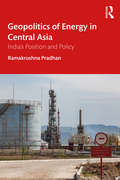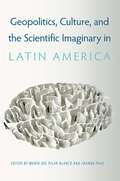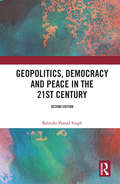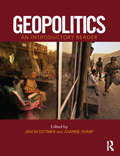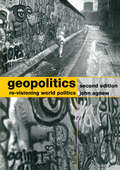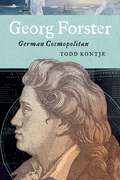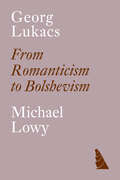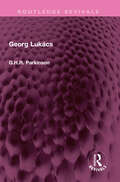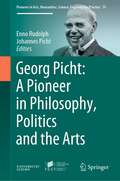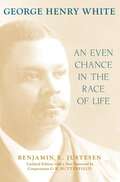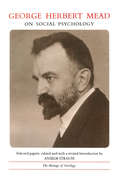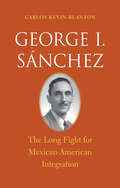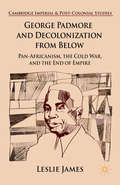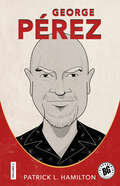- Table View
- List View
Geopolitics and Identity in British Foreign Policy Discourse: The Island Race (Routledge Geopolitics Series)
by Nick WhittakerThis is the first book to examine Britain’s geopolitical identity and how it is expressed in foreign policy discourse. It demonstrates how British imperial thought, related to its island status, has remained important for British Members of Parliament in their debates of contemporary issues. It presents an exciting and provocative new reading of modern British foreign policy that decentres traditional notions of rationalism and pragmatism by foregrounding the much-neglected aspects of identity and geopolitical space. As British foreign policy-makers wrestle with how to define Britishness outside of the EU, this analysis provides a fresh perspective. It presents a much-needed historical contextualisation of long-standing concepts such as insularity from Europe and a universal aspect on world affairs. This book will be highly relevant for students, researchers and professionals that are seeking to understand British foreign policy. It will be of interest to those researching and working within geopolitics, identity, sociology, foreign policy analysis and international relations.
Geopolitics and Maritime Territorial Disputes in East Asia (Routledge Security in Asia Pacific Series)
by Ralf EmmersGeopolitics is a crucial element in understanding international relations in East Asia, with major and medium powers competing for influence. This book examines geopolitics in East Asia, focusing in particular on its major, contentious maritime territorial disputes. It looks in particular detail at the overlapping claims between Japan, China and Taiwan over the Senkaku/Diao yu Islands in the East China Sea as well as the Paracel Islands claimed by China, Taiwan, and Vietnam and the Spratly Islands involving Brunei, China, Malaysia, the Philippines, Taiwan, and Vietnam in the South China Sea. The book offers a comparative study of the East and South China Seas by arguing that their respective circumstances are influenced by similar geopolitical considerations; factors such as territory, natural resources and power competition all impact on disputes and broader regional relations. It is precisely the interplay of these geopolitical forces that can lead to the rapid escalation of a maritime territorial dispute or reversely to a diffusion of tensions. The book considers how such disputes might be managed and resolved peacefully, despite the geopolitical conditions that can make co-operation on these issues difficult to achieve. Ralf Emmers examines the prospect for conflict management and resolution by identifying catalysts which may contribute to improving the climate of relations.
Geopolitics and the Indo-Pacific Region
by Ashok KapurExploring the geopolitics of the Indo-Pacific region, a major hub of global economic/commercial, military, diplomatic and cultural activities in the 21st century, this textbook provides students with an introduction to the existing debates, frameworks and issues surrounding the Indo-Pacific. The book explains the historical background to highlight the significance of the region, the shift of power from West to East and the importance of the growing connectivity between Asia-Pacific and the Indo-Pacific areas. Covering relations between China and the USA, India, Vietnam and China’s southern neighbours in Southeast Asia, along with Japan, Taiwan, Australia, Sri Lanka and Myanmar, it presents the different arguments regarding the caveats and meaning of ‘Indo-Pacific’. In so doing, it shows that the region is the 'theatre' of great power and middle power competition and suggests that third parties have an area of autonomy in their dealing with American and Chinese leaders. Complete with a list of further readings, Geopolitics and the Indo-Pacific Region fills a gap in the market and will be of great interest to upper-level undergraduates, postgraduate students and researchers studying international relations, ipe, geopolitics, Asian politics and Asian security studies.
Geopolitics and the Indo-Pacific Region
by Ashok KapurExploring geopolitics of the Indo-Pacific Region, a major hub of global, economic, commercial, military, diplomatic, and cultural activities in the 21st century, this textbook provides students with an introduction to the existing debates, frameworks, and issues surrounding the Indo-Pacific.The second edition has been revised, updated, and expanded to explain the major build-up of deterrence hubs during 2022–2023 in the Indo-Pacific Region (IPR). The hubs have a clear focus on North Asia (Japan and South Korea), the Taiwan Strait and Taiwan and the South China Sea (the Philippines, Vietnam, and Australia), and India and the Indian Ocean littoral areas (the Persian Gulf and the Bay of Bengal). This edition takes into account the effects of the Ukraine–Russia and Israel–Hamas/Iran proxies’ conflicts on the build-up of Russia–China–North Korea–Iran ties and the naval projections by China and Russia in North Pacific, off the Alaska coast, and in relation to Myanmar and Bangladesh and the Gulf/Red Sea areas. Within the purview of maritime security and NATO, the present century is critical with the introduction of missiles and nuclear submarine technology into IPR and by the fragmentation of arms control and nuclear and missile non-proliferation arrangements of the 1960s–2000 period. This volume predicts that China’s oft-proclaimed rise to global hegemonic status is not inevitable because of its many economic–social problems and foreign policy dilemmas. Nor is World War III inevitable because no one seeks unlimited warfare, but the regions in conflict will likely remain on a low boil. However, problem-solving and crisis resolution will remain problematic, keeping the 21st century at its toes, due to the inability of regional powers to unite for the common good.Complete with a list of further reading, Geopolitics and the Indo-Pacific Region fills a gap in the market and will be of great interest to upper-year-level undergraduates, postgraduate students, and researchers studying international relations, IPR geopolitics, Asian politics, and Asian security studies.
Geopolitics and the Western Pacific: China, Japan and the US (Routledge Security in Asia Pacific Series)
by Leszek BuszynskiThis book examines the development of China’s national ambitions under its current leader Xi Jinping and the dilemma they present for the United States and also Japan. It emphasises the importance of geopolitics, that is the way national strategies and policies are shaped and in some cases determined by geographic location. Focusing especially on China’s national rejuvenation and its rapidly growing military capability and navy, and on the likely impact on the region of China regaining the status and influence it enjoyed in dynastic times, the book highlights the hard choices faced by the United States as it seeks to protect its geopolitical position in the Western Pacific, particularly in the South China Sea, the Korean Peninsula and the Taiwan straits. How far should the United States confront China or accommodate China, possibly at the risk of undermining its geopolitical position and its alliance relationships with Japan, Australia and South Korea? The book also discusses the degree to which issues of institution building and economic interdependence can overcome or constrain geopolitical calculations.
Geopolitics at the Internet’s Core (Information Technology and Global Governance)
by Laura DeNardis Francesca Musiani Nanette S. Levinson Fiona M. AlexanderContentious geopolitical conflicts over digital technologies have arisen around a complex set of technical specifications at the Internet&’s core. One of these is the Internet Protocol (IP), designed for addressing and routing information to its destination. China redesigning the Internet? Ukraine asking that Russia be disconnected from the Internet? The U.S. &‘surrendering&’ the Internet? The Internet Protocol - rightly or not - has been at the center of many digital policy concerns for decades. In examining entanglements between IP and public interest issues, Geopolitics at the Internet&’s Core illuminates how technical infrastructure is now a proxy for political and economic power. Ongoing global controversies over the Internet Protocol ecosystem hint at its importance and why IP is a flashpoint mediating broader conflicts in various cultural and historic contexts. Geopolitics at the Internet&’s Core analyzes the trajectory and possible futures of the Internet Protocol as a space mediating geopolitical and domestic controversies in an increasingly contentious digital world; it explains the IP ecosystem, a complex combination of virtual resources, abstract specifications, tangible infrastructure, functionally specific systems, and the institutions and rules that design and govern these systems. With a view toward the future and insights into the governance of emerging technologies, this book identifies eight IP-related levers of power that illuminate technology governance debates. Opening up the black box of the Internet Protocol and related global governance challenges, it explains the political battles and the stakes of these battles at the heart of the Internet.
Geopolitics of Digital Heritage (Elements in Critical Heritage Studies)
by Natalia Grincheva Elizabeth StainforthGeopolitics of Digital Heritage analyzes and discusses the political implications of the largest digital heritage aggregators across different scales of governance, from the city-state governed Singapore Memory Project, to a national aggregator like Australia's Trove, to supranational digital heritage platforms, such as Europeana, to the global heritage aggregator, Google Arts & Culture. These four dedicated case studies provide focused, exploratory sites for critical investigation of digital heritage aggregators from the perspective of their geopolitical motivations and interests, the economic and cultural agendas of involved stakeholders, as well as their foreign policy strategies and objectives. The Element employs an interdisciplinary approach and combines critical heritage studies with the study of digital politics and communications. Drawing from empirical case study analysis, it investigates how political imperatives manifest in the development of digital heritage platforms to serve different actors in a highly saturated global information space, ranging from national governments to transnational corporations.
Geopolitics of Energy in Central Asia: India's Position and Policy
by Ramakrushna PradhanThis book focuses on the geopolitics of Central Asia which has emerged as the new fertile ground for oil and energy resources. It analyses the scramble for energy and control over the region by many nations and their diplomatic manoeuvrings to ensure energy sufficiency and economic growth. The book provides a quantitative analysis of the Central Asian energy potential and offers an understanding of the unique position that each country occupies in the geopolitics of oil and energy in the region. It looks at aggressive foreign policies by countries like the US, China, the European Union, Japan, Israel, Iran and Pakistan, focusing primarily on India’s position and strategies in the region within the new great game. The book further examines the dynamics between Central Asia and India and India’s policies for geopolitical engagement and diversification of energy sources. This volume will be of interest to researchers and students of political studies, international relations, economics, sociology, and Asian studies. It will also be useful for policymakers and professionals working in the field of energy security and geo-economics.
Geopolitics, Culture, and the Scientific Imaginary in Latin America
by Joanna Page María del Pilar BlancoHighlighting the relationship among science, politics, and culture in Latin American history Challenging the common view that Latin America has lagged behind Europe and North America in the global history of science, this volume reveals that the region has long been a center for scientific innovation and imagination. It highlights the important relationship among science, politics, and culture in Latin American history.Scholars from a variety of fields including literature, sociology, and geography bring to light many of the cultural exchanges that have produced and spread scientific knowledge from the early colonial period to the present day. Among many topics, these essays describe ideas on health and anatomy in a medical text from sixteenth-century Mexico, how fossil discoveries in Patagonia inspired new interpretations of the South American landscape, and how Argentinian physicist Rolando García influenced climate change research and the field of epistemology. Through its interdisciplinary approach, Geopolitics, Culture, and the Scientific Imaginary in Latin America shows that such scientific advancements fueled a series of visionary utopian projects throughout the region, as countries grappling with the legacy of colonialism sought to modernize and to build national and regional identities.
Geopolitics, Democracy and Peace in the 21st Century
by Balmiki Prasad SinghThis book examines a wide range of issues that are expected to play a dominant role in shaping the 21st century. Delineating key concerns in geopolitics, democracy and peace, it studies the functions and influences of educational institutions, progressive religious and social groups, communities, international institutions such as the United Nations (UN); and forums promoting inter-faith dialogue. The author underscores how the century may be forged by a pluralist ethos: multiple and diverse nation states, centres of power, faiths, cultures, economies, and languages. He stresses the need to nurture moral strength and enlightened leadership for a life of compassion, peace and holistic development. In his second edition, the author further examines what the future holds for democracy. The volume takes stock of the recent developments in world politics, and highlights the urgent need for the Bahudha approach — inculcating a culture of dialogue and debate for peaceful resolution of conflicts. Lucid and engaging, this book will interest scholars and researchers of political studies, international relations, public policy, governance and development studies.
Geopolitics: An Introductory Reader (Critical Geopolitics)
by Jason Dittmer Jo SharpIt has been increasingly impossible to think about our changing world without coming across the term 'geopolitics'. In the wake of the invasion and occupation of Iraq by the United States, United Kingdom, and others, geopolitics has been offered as an explanation for the occupation's failure to reinvent the Iraqi state and as a blueprint for future action. But what is 'geopolitics'? Drawing both on academic and political material, this book introduces readers to the concept of geopolitics, from the first usage of the term to its more recent reconceptualisations. The concept of geopolitics is introduced through four thematic sections - Imperial Geopolitics, Cold War Geopolitics, Geopolitics after the Cold War and Reconceptualising Geopolitics. Each section includes key writings from a range of diverse and leading authors such as Said, Agnew, Dalby, O Tuathail, Gregory, Barnett and Kaplan, and is accompanied by a critical introduction by the editors to guide the reader through the material. This Reader establishes the foundations of geopolitics while also introducing readers to the continuing significance of the concept in the 21st century. This Reader provides an essential resource that exposes students to original writing. The Editors provide a pathway through the material with Section Introductions to assist the readers understanding of the context of the material and impacts of the writings. The readings included draw from a range of authors, writing from a range of locations. The Reader concludes with the latest changes in geopolitical thought, incorporating feminist and other perspectives.
Geopolitics: Re-Visioning World Politics
by John AgnewGeopolitics identifies and scrutinizes the central features of geopolitics from the sixteenth century to the present. The book focuses on five key concepts of the modern geopolitical imagination: * Visualising the world as a whole * The definition of geographical areas as 'advanced' or 'primitive' * The notion of the state being the highest form of political organization * The pursuit of primacy by competing states * The necessity for hierarchy.
Georg Forster: German Cosmopolitan (Max Kade Research Institute)
by Todd KontjeGeorg Forster (1754–1794) was famous during his lifetime, notorious after his death, and largely forgotten by the later nineteenth century. Remembered today as the young man who sailed around the world with Captain Cook and as one of the leading figures in the revolutionary Republic of Mainz, Forster was also a prolific writer and translator who left behind two travelogues, a series of essays on diverse topics, and numerous letters. This in-depth look at Forster’s work and life reveals his importance for other writers of the age. Todd Kontje traces the major intellectual themes and challenges found in Forster’s writings, interweaving close textual analysis with his rich but short life. Each chapter engages with themes that reflect the current debates in eighteenth-century literary and cultural studies, including changing notions of authorship, multilingualism, the representation of so-called primitive societies, Enlightenment ideas about race, and early forms of ecological thinking. As Kontje shows, Forster’s peripatetic life, malleable sense of national identity, and fluency in multiple languages contrast with the image of the solitary genius in the “age of Goethe.” In this way, Forster provides a different model of authorship and citizenship better understood in the context of an increasingly globalized world.Compellingly argued and engagingly written, this book restores Forster to his rightful place within the German literary tradition, and in so doing, it urges us to reconsider the age of Goethe as multilingual and malleable, local and cosmopolitan, dynamic and decentered. It will be welcomed by specialists in German studies and the Enlightenment.
Georg Lukacs: From Romanticism to Bolshevism
by Michael LöwyOn the 100th anniversary of the publication of History and Class Consciousness, a new edition of this indispensable guide to Lukacs's thought and politicsThe philosophical and political development that converted Georg Lukács from a distinguished representative of Central European aesthetic vitalism into a major Marxist theorist and Communist militant has long remained an enigma.In this this now classic study, Michael Löwy for the first time traced and explained the extraordinary mutation that occurred in Lukács's thought between 1909 and 1929. Utilizing many as yet unpublished sources, Löwy meticulously reconstructed the complex itinerary of Lukács's thinking as he gradually moved towards his decisive encounter with Bolshevism.The religious convictions of the early Lukács, the peculiar spell exercised on him and on Max Weber by Dostoyevskyan images of pre-revolutionary Russia, the nature of his friendships with Ernst Bloch and Thomas Mann, were amongst the discoveries of the book.Then, in a fascinating case-study in the sociology of ideas, Löwy showed how the same philosophical problematic of Lebensphilosophie dominated the intelligentsias of both Germany and Hungary in the pre-war period, yet how the different configurations of social forces in each country bent its political destiny into opposite directions. The famous works produced by Lukács during and after the Hungarian Commune—Tactics and Ethics, History and Class Consciousness and Lenin—were analysed and assessed. A concluding chapter discussed Lukács's eventual ambiguous settlement with Stalinism in the thirties, and its coda of renewed radicalism in the final years of his life.In this new edition, Löwy has added a substantial new introduction which reassess the nature of Lukacs's thought in the light of newly published texts and debates.
Georg Lukács (Routledge Revivals)
by G.H.R. ParkinsonFirst published in 1977, Georg Lukács gives an outline of Lukács’ views and explains how they are related to the relevant cultural traditions of his epoch. The author covers the whole range of Lukács’ thought, from his earliest literary criticism to the posthumous Ontology of Social Existence. Lukács’ early writings in particular are frequently obscure in style and impregnated with the language and thought of Hegel. Professor Parkinson has elucidated Lukács’ principal writings in systematic fashion, and the book includes a detailed exposition of Lukács’ influential but difficult book History and Class Consciousness. This should be an indispensable book for all those who seek a clear, comprehensible introduction to the writings of one of the most influential Marxist thinkers of our time.
Georg Picht: A Pioneer in Philosophy, Politics and the Arts (Pioneers in Arts, Humanities, Science, Engineering, Practice #19)
by Johannes Picht Enno RudolphAimed at an international readership, this book offers a representative collection of essays by the German philosopher, Georg Picht (1913-1982), who was a specialist in Greek philosophy, practical philosophy and philosophy of religion. Picht's themes address different disciplines, such as ancient philosophy, systematic philosophy and political analysis, and often contain critical statements on significant developments from the European Enlightenment to the Cold War era. Other essays offer a distinctive interdisciplinary approach characteristic of the author. These contributions are relevant to both philosophy and science as they discuss, for instance, philosophical definitions of space and time or the relationship between history and evolution. Another part of the book includes texts on art that present Picht’s authentic definition of art and his theory of the interdependence of art and politics.• For the first time, key texts of the German philosopher and political thinker Georg Picht are presented to a global readership in English.• Like Nietzsche’s philosophy, Picht’s work is grounded in his outstanding professionalism in the different fields of classics, embracing not only textsand theories of the great thinkers from the pre-Socratic to the post-Aristotelian and Stoic philosophies but also the main currents of ancient literature.• Picht’s importance as a political author and public adviser is exceptional, and may explain why his lifelong friend Carl Friedrich von Weizsäcker – another pioneer presented in this series – called him his “teacher”.
Georg Simmel: Critical Assessments (Key Sociologists)
by David FrisbyUntil recently little of Simmel's work was available in translation and certain key texts were unknown outside Germany. David Frisby, the eminent Simmel scholar, provides not only an introduction to the major sociological writings of this important figure, but also an argument for a reconsideration of his work. The author outlines the cultural and historical context in which Simmel worked; reviews Simmel's most important writings; and examines his legacy to sociology by illuminating his links with Weber's theories and his influential relationship with Marxism.Simmel, a central figure in the development of modern sociology, and a contemporary of Weber and Durkheim, was one of the first to identify sociology as a separate discipline. His ideas influenced Weber, the Chicago School, and many later sociologists. His introduction of a number of basic concepts to sociology, such as exchange, interaction and differentiation, attest to his intellectual stature and the far-reaching significance of his work.
George Berkeley: A Philosophical Life
by Tom JonesA comprehensive intellectual biography of the Enlightenment philosopherIn George Berkeley: A Philosophical Life, Tom Jones provides a comprehensive account of the life and work of the preeminent Irish philosopher of the Enlightenment. From his early brilliance as a student and fellow at Trinity College Dublin to his later years as Bishop of Cloyne, Berkeley brought his searching and powerful intellect to bear on the full range of eighteenth-century thought and experience.Jones brings vividly to life the complexities and contradictions of Berkeley’s life and ideas. He advanced a radical immaterialism, holding that the only reality was minds, their thoughts, and their perceptions, without any physical substance underlying them. But he put forward this counterintuitive philosophy in support of the existence and ultimate sovereignty of God. Berkeley was an energetic social reformer, deeply interested in educational and economic improvement, including for the indigenous peoples of North America, yet he believed strongly in obedience to hierarchy and defended slavery. And although he spent much of his life in Ireland, he followed his time at Trinity with years of travel that took him to London, Italy, and New England, where he spent two years trying to establish a university for Bermuda, before returning to Ireland to take up an Anglican bishopric in a predominantly Catholic country.Jones draws on the full range of Berkeley’s writings, from philosophical treatises to personal letters and journals, to probe the deep connections between his life and work. The result is a richly detailed and rounded portrait of a major Enlightenment thinker and the world in which he lived.
George Henry White: An Even Chance in the Race of Life (Southern Biography Series)
by Benjamin R. Justesen G. K. ButterfieldAlthough he was one of the most important African American political leaders during the last decade of the nineteenth century, George Henry White has been one of the least remembered. A North Carolina representative from 1897 to 1901, White was the last man of his race to serve in the Congress during the post-Reconstruction period, and his departure left a void that would go unfilled for nearly thirty years. At once the most acclaimed and reviled symbol of the freed slaves whose cause he heralded, White remains today largely a footnote to history. In this exhaustively researched biography, Benjamin R. Justesen rescues from obscurity the fascinating story of this compelling figure's life and accomplishments.The mixed-race son of a free turpentine farmer, White became a teacher, lawyer, and prosecutor in rural North Carolina. From these modest beginnings he rose in 1896 to become the only black member of the House of Representatives and perhaps the most nationally visible African American politician of his time. White was outspoken in his challenge to racial injustice, but, as Justesen shows, he was no militant racial extremist as antagonistic white democrats charged. His plea was always for simple justice in a nation whose democratic principles he passionately loved. A conservative by philosophy, he was a dedicated Republican to the end. After he retired from Congress, he remained active in the fight against racial discrimination, working with national leaderas of both races, from Booker T. Washington to the founders of the NAACP. Through judicious use of public documents, White's speeches, newspapers, letters, and secondary sources, Justesen creates an authoritative and balanced portrait of this complex man and proves him to be a much more effective leader than previously believed.
George Herbert Mead on Social Psychology (The Heritage Sociology)
by George HerbertOne of the most brilliantly original of American pragmatists, George Herbert Mead published surprisingly few major papers and not a single book during his lifetime. Yet his influence on American sociology and social psychology since World War II has been exceedingly strong. This volume is a revised and enlarged edition of the book formerly published under the title The Social Psychology of George Herbert Mead. It contains selections from Mead's posthumous books: Mind, Self, and Society; Movements of Thought in the Nineteenth Century; The Philosophy of the Act; and The Philosophy of the Present, together with an incisive, newly revised, introductory essay by Anselm Strauss on the importance of Mead for contemporary social psychology. "Required reading for the social scientist."—Milton L. Barron, Nation
George I. Sánchez
by Carlos Kevin BlantonGeorge I. Sánchez was a reformer, activist, and intellectual, and one of the most influential members of the "Mexican American Generation" (1930-1960). A professor of education at the University of Texas from the beginning of World War II until the early 1970s, Sánchez was an outspoken proponent of integration and assimilation. He spent his life combating racial prejudice while working with such organizations as the ACLU and LULAC in the fight to improve educational and political opportunities for Mexican Americans. Yet his fervor was not always appreciated by those for whom he advocated, and some of his more unpopular stands made him a polarizing figure within the Latino community.Carlos Blanton has published the first biography of this complex man of notable contradictions. The author honors Sánchez's efforts, hitherto mostly unrecognized, in the struggle for equal opportunity, while not shying away from his subject's personal faults and foibles. The result is a long-overdue portrait of a towering figure in mid-twentieth-century America and the all-important cause to which he dedicated his life: Mexican American integration.
George Padmore and Decolonization from Below: Pan-Africanism, the Cold War, and the End of Empire (Cambridge Imperial and Post-Colonial Studies Series)
by L. JamesThis book argues that the rising tide of anti-colonialism after the 1930s should be considered a turning point not just in harnessing a new mood or feeling of unity, but primarily as one that viewed empire, racism, and economic degradation as part of a system that fundamentally required the application of strategy to their destruction.
George Pérez (Biographix #6)
by Patrick L. HamiltonBorn in the South Bronx to Puerto Rican parents, artist and writer George Pérez (1954–2022) cut his teeth in the 1970s as an artist at Marvel who worked on lesser titles like The Deadly Hands of Kung Fu and Creatures on the Loose, and then mainstays like Fantastic Four and The Avengers. In the 1980s, Pérez jumped ship to DC where he helped turn The New Teen Titans into a top-selling title and cocreated Crisis on Infinite Earths, which marked the publisher’s fiftieth anniversary and consolidated its sprawling universe. As writer and artist, Pérez relaunched DC’s Wonder Woman, a run that later inspired much of the 2017 film.Though Pérez’s style is highly recognizable, his contributions to comic art and history have not been fully acknowledged. In George Pérez, author Patrick L. Hamilton addresses this neglect, first, by discussing Pérez’s artistic style within the context of Bronze Age superhero art, and second, by analyzing Pérez’s work for its representations of race, disability, and gender. Though he struggled with deadlines and health issues in the 1990s, Pérez would reintroduce himself and his work to a new generation of comics fans with a return to Marvel’s The Avengers, as well as attempts at various creator-owned comics, the last of these being Sirens from Boom! Studios in 2014. Throughout his career, Pérez established a dynamic and minutely detailed style of comic art that was both unique and influential.
George Sand and Frederick Chopin in Majorca
by SandFirst published in 2008. Routledge is an imprint of Taylor & Francis, an informa company.
George Seldes’ War for the Public Good: Weaponising a Free Press (Palgrave Studies in the History of the Media)
by Helen FordhamThis book examines the idea of fake news through an analysis of the work of early to mid-twentieth century press critic George Seldes. By examining fake news - also known as propaganda and misinformation - from this period it becomes evident that it is a phenomenon that emerges in response to particular social, political and economic conditions. It is, therefore, not a new process but always a feature of the media ecosystem. Seldes’ work makes evident that contemporary anxieties about the role, function, future and credibility of journalism were expressed in the 1930s and 1940s. The same fears were circulated about the consequences of fake news and propaganda on democratic debate. The same concerns were also expressed about how technology extends the circulation of propaganda and fake news, and affects journalism practices. An analysis of Seldes’ media criticism of the fake news, lies and propaganda in daily newspapers in the 1930s and 1940s exposes the historical nature and impact of fake news on public debate, and affirms the critical role of journalists in exposing fake news.
